All times listed are in Eastern Time Zone (EST)
Saturday, 9 January 2021
9:00 - 12:00 EST
Tutorial 1: Security and Privacy of 5G and Beyond 5G Networks
Tutorial 6: IoT Systems and Smartness – Digital Twin, Protocols, and Proof of Concept
12:30 - 15:30 EST
Tutorial 3: Blockchain for Cyberphysical Systems: Applications, Opportunities and Challenges
Tuesday, 12 January 2021
9:00 - 12:00 & 12:30 - 15:30 EST
Tutorial 7: Reconfigurable Intelligent Surfaces for Future Wireless Communications
Tutorial 8: Computing in Communication Networks
9:00- 12:00 EST
Tutorial 2: 6G: THE NEXT FRONTIER: The Goal Oriented Wireless Semantic Communications Revolution
Tutorial 4: Cellular-connected UAVs - A Tutorial Overview
Tutorial 5: Intra-body Communication Networks: State of the Art and Future Perspectives of Ultrasounds and Coupling Technologies
Tutorial 9: Toward 5G mmWave Cellular Networks: Potential, Challenges, and Enablers
12:30 - 15:30 EST
Tutorial 10: AI-enabled Future Wireless Networks: Opportunities and Challenges Towards 6G
Tutorial 1: Security and Privacy of 5G and Beyond 5G Networks
Date: Saturday, 9 January 2021
Time: 9:00 - 12:00 EST
Instructor: M. Liyanage, University College Dublin, Ireland
Bio:
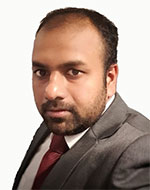 Madhusanka Liyanage
Madhusanka Liyanage
Madhusanka Liyanage received his PhD in communication engineering from the University of Oulu, Oulu, Finland. He is currently working as an Ad Astra Fellow/Assistant Professor at School of Computer Science, University College Dublin, Ireland. He is also an adjunct professor at the University of Oulu, Finland. He was also a recipient of prestigious Marie Skłodowska-Curie Actions Individual Fellowship during 2018-2020. During 2015-2018, he has been a Visiting Research Fellow at the CSIRO, Australia, the Infolabs21, Lancaster University, U.K., Computer Science and Engineering, The University of New South Wales, Australia, School of IT, University of Sydney, Australia, LIP6, Sorbonne University, France and Computer Science and Engineering, The University of Oxford, U.K. He is also a senior member of IEEE. In 2020, he has received "2020 IEEE ComSoc Outstanding Young Researcher" award by IEEE ComSoc EMEA. Madhusanka is a co-author of over 100 publications including three edited books with Wiley, including 5G security. His research interests include 5G/6G, Blockchain, Network security, Virtual Networks, Security Protocols, Software Defined Networking (SDN), Internet of Things (IoT), Multi-access Edge Computing (MEC). More info: www.madhusanka.com
Tutorial 2: 6G: THE NEXT FRONTIER: The Goal Oriented Wireless Semantic Communications Revolution
Date: Tuesday, 12 January 2021
Time: 9:00- 12:00 EST
Instructor: E. Calvanese-Strinati, CEA-LETI, France
Bio:
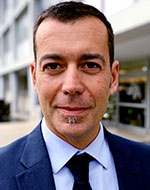 Emilio Calvanese Strinati
Emilio Calvanese Strinati
Dr. Emilio Calvanese Strinati obtained his Ph.D in Engineering Science in 2005 from Telecom Paris, France. He worked at Motorola Labs between 2002 and 2006. In 2006 he joints CEA/LETI as a research engineer. From 2007, he becomes a PhD supervisor. From 2011 to 2016 he was the Smart Devices & Telecommunications European collaborative strategic programs Director. Between December 2016 and January 2020 is was the Smart Devices & Telecommunications Scientific and Innovation Director. In February 2018 he directed the first 5G mobile millimeter waves demonstration in realistic operational environments at the 2018 winter Olympic Games, 5G technologies. Since 2018 he holds the French Research Director Habilitation (HDR). Since February 2020 he directs activities at CEA Leti focusing on future 6G technologies.
E. Calvanese Strinati has published around 120 papers in international conferences, journals and books chapters, given more than 150 international invited talks, keynotes and tutorials. He is the main inventor or co-inventor of more than 60 patents.
Tutorial 3: Blockchain for Cyberphysical Systems: Applications, Opportunities and Challenges
Date: Saturday, 9 January 2021
Time: 12:30 - 15:30 (EST)
Instructors: S. Kanhere, UNSW Sydney, Australia, R. Jurdak, A. Dorri, Queensland University of Technology, Australia
Bios:
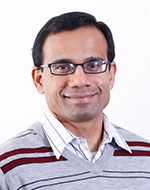 Salil Kanhere
Salil Kanhere
Salil Kanhere received the M.S. and Ph.D. degrees from Drexel University, Philadelphia, USA. He is a Professor of Computer Science and Engineering with UNSW Sydney, Australia. His research interests include the Internet of Things, cyber physical systems, blockchain, pervasive computing, cybersecurity, and applied machine learning. Salil is also affiliated with CISRO’s Data61 and the Cybersecurity Cooperative Research Centre. He is a Senior Member of the IEEE and ACM and an ACM Distinguished Speaker. He has received the Friedrich Wilhelm Bessel Research Award (2020) and the Humboldt Research Fellowship (2014), both from the Alexander von Humboldt Foundation in Germany. He has held visiting positions at I2R Singapore, Technical University Darmstadt, University of Zurich and Graz University of Technology. He serves as the Editor in Chief of the Ad Hoc Networks journal and as an Associate Editor of the IEEE Transactions On Network and Service Management, Computer Communications, and Pervasive andMobile Computing. He has served on the organising committee of several IEEE/ACM international conferences and is the General Chair for the IEEE International Conference on Blockchain and Cryptocurrency (ICBC) 2021. He has co-authored a book titled Blockchain for Cyberphysical Systems published by Artech House in 2020.
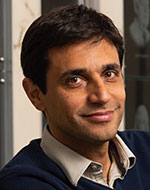 Raja Jurdak
Raja Jurdak
Raja Jurdakis a Professor of Distributed Systems and Chair in Applied Data Sciences at Queensland University of Technology, and Director of the Trusted Networks Lab. He received the PhD in information and computer sciences from the University of California, Irvine. He previously established and led the Distributed Sensing Systems Group at CSIRO’s Data61, where he maintains a visiting scientist role. His research interests include trust, mobility and energy-efficiency in networks. Prof. Jurdak has published over 180 peer-reviewed publications, including two authored books most recently on blockchain in cyberphysical systems in 2020. He serves on the editorial board of Ad Hoc Networks, and on the organising and technical program committees of top international conferences, including Percom, ICBC, IPSN, WoWMoM, and ICDCS. He is the lead TPC chair for ICBC is 2021. He is a conjoint professor with the University of New South Wales, and a senior member of the IEEE, and has held visiting academic roles at MIT and Oxford University.
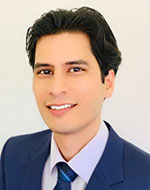 Ali Dorri
Ali Dorri
Ali Dorri is a Research Fellow at Queensland University of Technology (QUT), Brisbane, Australia. He received his Ph.D. degree from the University of New South Wales (UNSW), Sydney, Australia. He was also a Postgraduate research student at CSIRO, Australia. He was recognized in the list of the world's top 2% scientists for citation impact during the single calendar year 2019 published by Stanford University. He has received UNSW Dean’s Award for Outstanding PhD Theses. He delivered several talks, keynote speaks and tutorial. He is the lead author of a book titled “Blockchain for Cyberphysical Systems” published by Artech House in 2020. He has published over 30 peer-reviewed papers. His research interest includes blockchain applications and challenges in adopting blockchain in large scale networks including the Internet of Things, smart cities, smart grid, and e-health.
Tutorial 4: Cellular-connected UAVs - A Tutorial Overview
Date: Tuesday, 12 January 2021
Time: 9:00- 12:00 EST
Instructors: E. Natalizio, D. Mishra, Univ. de Lorraine, France
 Enrico Natalizio
Enrico Natalizio
Enrico Natalizio is the Principal Researcher of the Communications and Networking Department of the Autonomous Robotics Research Center (ARRC) of the Technology Innovation Institute (TII), and a Full Professor at the Université de Lorraine within the LORIA Lab. Until 2018, he was an Associate Professor at the Université de Technologie de Compiégne (UTC), France, in the Network and Optimization Group within the Heudiasyc Lab. He obtained his Ph.D. from the Universita della Calabria, Italy and he was a visiting researcher at the Broadband Wireless Networking Laboratory at Georgia Tech in Atlanta, USA.\@'Between 2005 and 2010, he worked as a research fellow and a contract professor at the Universita della Calabria, Italy. From 2010 to 2012 he worked at INRIA Lille as a postdoctoral researcher. His current research interests include group communication in wireless robot and sensor networks and coordination and cooperation among swarm networked devices.
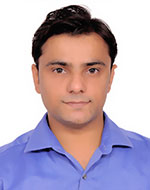 Debashisha Mishra
Debashisha Mishra
Debashisha Mishra received his master degree from Dept. of Computer Science and Engineering, Indian Institute of Technology, Hyderabad, India. He is currently a doctoral student in Université de Lorraine, Nancy, France. His main research interests are in the area of unmanned aerial vehicle communication and networking with 5G/B5G cellular systems, autonomous systems and cloud-assisted approaches for next generation wireless networks.
Tutorial 5: Intra-body Communication Networks: State of the Art and Future Perspectives of Ultrasounds and Coupling Technologies
Date: Tuesday, 12 January 2021
Time: 9:00- 12:00 EST
Instructors: L. Galluccio, A. Vizziello, P. Savazzi, Univ. of Catania, Univ. of Pavia, Italy
Bios:
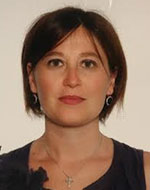 Laura Galluccio
Laura Galluccio
Laura Galluccio received her Laurea degree in Electrical Engineering from University of Catania, Italy, in 2001. In March 2005 she got her Ph.D. in Electrical, Computer and Telecommunications Engineering at the same university. Since 2002 she is also at the Italian National Consortium of Telecommunications (CNIT), where she worked as a Research Fellow. Since November 2010 to October 2019 she has been Assistant Professor at University of Catania. From November 2019 she is Associate Professor at the same university. Her research interests include unconventional networks including ultrasonic and microfluidic networks, ad hoc and sensor networks in general, protocols and algorithms for wireless networks, and network performance analysis. From May to July 2005 she has been Visiting Scholar at the COMET Group, Columbia University, NY. In September 2015 she has been Visiting Professor at Central Supelec, Gif-sur-Yvette, Paris. She is senior member of the IEEE. Dr. Galluccio is and has been Leading Guest Editor of Elsevier Journals, and IEEE Magazines. She serves and has served in the Editorial Board of IEEE Transactions on Wireless Communications, Elsevier Computer Networks, IEEE Communication Letters, Wireless Communications and Mobile Computing (WCMC), and Elsevier Ad Hoc Networks Journal.
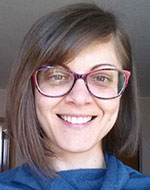 Anna Vizziello
Anna Vizziello
Anna Vizziello received the Laurea degree in electronic engineering and the Ph.D. degree in electronics and computer science from the University of Pavia, Italy, in 2007 and in 2011, respectively. Currently she is a Senior Research Associate with the Telecommunication and Remote Sensing Laboratory, University of Pavia, Italy, under the Research Grant on “Intra-body communication systems for nervous signal transmissions”. In 2015-2017 she was working on communication algorithms for N-RFID network within the national PRIN GRETA Project. She has been Visiting Researcher in several universities: in 2011 and 2016 she was with Northeastern University, Boston, MA, working on communications for implanted sensors; from 2009 to 2010 with the Broadband Wireless Networking Lab, Georgia Institute of Technology, Atlanta, GA, under the supervision of Prof. I. F. Akyildiz, and in 2009 and 2010 with the Universitat Politècnica de Catalunya, Barcelona, Spain, on the subject of cognitive radio networks. From 2007 to 2009, she collaborated as researcher with the European Centre for Training and Research in Earth quake Engineering (EUCENTRE) for biomedical data transmission within the EU PROETEX Project and an Italy-Turkey FIRB Project. Since 2013 she collaborates with the European Commission as Referee for the peer evaluation process of the proposals for FET call and H2020 ICT call. She has been included in the 2018 list of “N2Women: Rising Stars in Computer Networking and Communications” for outstanding and impactful contributions in the area of networking/communications, supported by the IEEE Communication Society. Her main research interests include intra-body networks, 5G radio technologies, cognitive radio and wireless sensor networks. She is senior member of the IEEE.
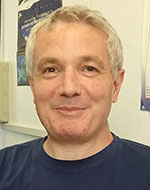 Pietro Savazzi
Pietro Savazzi
Pietro Savazzi received his Laurea degree in Electronics Engineering and Ph.D. degree in Electronics and Computer Science from the University of Pavia, Italy, in 1995 and in 1999, respectively. In 1999, he joined Ericsson Lab Italy, in Milan, as a system designer, working on broadband microwave systems. In 2001, he moved to Marconi Mobile, Genoa, Italy, as a system designer in the field of 3G wireless systems. Since 2003, he has been working at the University of Pavia where he is currently teaching courses on signal processing, wireless communications, and wireless sensor networks for biomedical applications. His main research interests are in wireless communications and sensor systems, with a focus on modulation and coding, adaptive signal processing, MIMO architectures, intra-body networks, and wearable wireless sensors. During his research activities, he has been involved in several research projects and contracts, some of them as the principal investigator. He authored more than 70 papers, in both international journals and conferences, and one patent. He is or has been a member of the Technical Program Committee for several conferences like, for instance, IEEE International Conference on Wireless for Space and Extreme Environments (WiSEE), IEEE Vehicular Technology Conference, IEEE Sensors.
Tutorial 6: IoT Systems and Smartness – Digital Twin, Protocols, and Proof of Concept
Date: Saturday, 9 January 2021
Time: 9:00 - 12:00 EST
Instructors: R. Venkatesha Prasad, A. Rahim, Delft Univ. of Technology, The Netherlands
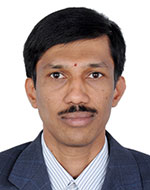 R. Venkatesha Prasad
R. Venkatesha Prasad
Dr. R Venkatesha Prasad (SM 2012, DL 2017-20) is an associate professor at Embedded Software group of Delft University of Technology (TU Delft) since 2013. Between 2005 and 2012, he was a senior researcher and adjunct faculty at TU Delft. At TU Delft, he has supervised 18 PhD students (15 graduated, 3 ongoing) and 43 MSc students (36 graduated). He has (co-)authored more than 200 publications in the peer-reviewed international transactions/journals and conferences in the areas of Tactile Internet, Internet of Things (IoT), Cyber Physical Systems (CPS), Energy-harvesting, 60 GHz mmWave networks, Smart-energy systems, Personal networks, Cognitive Radios and Voice over Internet Protocol (VoIP). He has been successful in acquiring and executing several European and Dutch national projects in the areas of IoT, Future home networks (60 GHz), Smart-energy systems, Personal networks, and Cognitive Radios.
Venkatesha Prasad received his 4TU University Teaching Qualification diploma with excellence in 2015. Recognizing his research contributions to IoT, he has been selected as an IEEE Communication Society (ComSoc) Distinguished Lecturer on Internet of Things for the period 2016-2018. He has been contributing significantly to valorise research to practice by contributing to standards on Cognitive radios and Tactile Internet. He is currently the vice-chair of IEEE Tactile Internet standardization group. He is also leading many IEEE activities through positions in standards boards (secretary in the ComSoc standards board) and technical committees (vice-chair of cognitive networking committee in 2013-16). He is on the editorial board of many international transactions and magazines and is a regular TPC member for many prestigious journals and conferences. He was responsible for the signing of MoU between IISc - TU Delft and he is anchoring ISRO-TU Delft cooperation. He is a senior member of IEEE and ACM. He is a Fellow of IETE. He completed his PhD from IISc, Bangalore, India in 2003. During his PhD research, a scalable VoIP conferencing platform was designed. His thesis work led to a start-up venture, Esqube Communication Solutions. While at Esqube, eight patent applications and three PCT applications were filed along with his colleagues. He was instrumental in Esqube’s selection as top 100 IT innovators in India in 2006 by NASSCOM and top 100 promising companies in Asia by RedHerring in 2008. Recently, he led a student team to win the worldwide Airbus challenge -- Fly Your Ideas (2019).
Tutorial 7: Reconfigurable Intelligent Surfaces for Future Wireless Communications
Date: Tuesday, 12 January 2021
Times: 9:00 - 12:00 & 12:30 - 15:30 EST
Instructors: A. Zappone, M. Di Rienzo, S. Jin, M. Debbah, Univ. of Cassino, Italy
Bios:
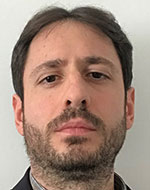 Alessio Zappone
Alessio Zappone
Alessio Zappone (SM'16) received his M.Sc. and Ph.D. both from the University of Cassino and Southern Lazio (Cassino, Italy). In 2012 he has worked with the Consorzio Nazionale Interuniversitario per le Telecomunicazioni (CNIT) in the framework of the FP7 EU-funded project TREND. From 2012 to 2016 he has been with the Dresden University of Technology, managing the project CEMRIN on energy-efficient resource allocation in wireless networks, funded by the German research foundation (DFG). In 2017 he was the recipient of the H2020 MSCA-IF BESMART fellowship for experienced researchers, carried out at the LANEAS group of CentraleSupelec (Gif-sur-Yvette, France). He serves as senior editor of the IEEE Signal Processing Letters and has served as guest editor for two special issue of the IEEE Journal on Selected Areas in Communications, one on Energy-efficient Techniques for 5G, and one on Wireless Networks Empowered by Reconfigurable Intelligent Surfaces. Since 2019, he is a tenured professor at the University of Cassino and Southern Lazio.
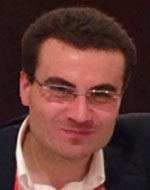 Marco Di Renzo
Marco Di Renzo
Marco Di Renzo (F’20) received the Laurea (cum laude) and Ph.D. degrees in electrical engineering from the University of L'Aquila, Italy, in 2003 and 2007, respectively, and the Habilitation á Diriger des Recherches (Doctor of Science) degree from University Paris-Sud, France, in 2013. Since 2010, he has been a Chargé de Recherche CNRS (CNRS Associate Professor) in the Laboratory of Signals and Systems (L2S) of Paris-Saclay University - CNRS, CentraleSupélec, Univ Paris Sud, Paris, France. He serves as the Associate Editor-in-Chief of IEEE Communications Letters, and as an Editor of IEEE Transactions on Communications, and IEEE Transactions on Wireless Communications. He is a Distinguished Lecturer of the IEEE Vehicular Technology Society and IEEE Communications Society, and a Senior Member of the IEEE. He is a recipient of several awards, including the 2013 IEEE-COMSOC Best Young Researcher Award for Europe, Middle East and Africa, the 2013 NoE-NEWCOM# Best Paper Award, the 2014-2015 Royal Academy of Engineering Distinguished Visiting Fellowship, the 2015 IEEE Jack Neubauer Memorial Best System Paper Award, the 2015-2018 CNRS Award for Excellence in Research and Ph.D. Supervision, the 2016 MSCA Global Fellowship (declined), the 2017 SEE-IEEE Alain Glavieux Award, the 2018 IEEE-COMSOC Young Professional in Academia Award, and 7 Best Paper Awards at IEEE conferences (2012 and 2014 IEEE CAMAD, 2013 IEEE VTC-Fall, 2014 IEEE ATC, 2015 IEEE ComManTel, 2017 IEEE SigTelCom, EAI 2018 INISCOM, IEEE ICC 2019).
Tutorial 8: Computing in Communication Networks
Date: Tuesday, 12 January 2021
Times: 9:00 - 12:00 & 12:30 - 15:30 EST
Instructors: F. Granelli, F. Fitzek, Univ. of Trento, Italy
Hands-On Instructions: Attendees of the tutorial are recommended to install the VM for the hands-on activities following the instructions.
Bios:
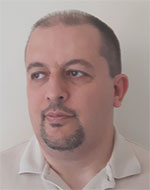 Fabrizio Granelli
Fabrizio Granelli
Fabrizio Granelli is an Associate Professor at the Dept. of Information Engineering and Computer Science (DISI) of the University of Trento (Italy). From 2012 to 2014, he was the Italian Master School Coordinator in the framework of the European Institute of Innovation and Technology ICT Labs Consortium. He was Delegate for Education at DISI in 2015-2016 and he is currently a member of the Executive Committee of the Trentino Wireless and Optical Testbed Lab. He was IEEE ComSoc Distinguished Lecturer for 2012-15, IEEE ComSoc Director for Online Content in 2016-17, and IEEE ComSoc Director for Educational Services in 2018-19. Prof. Granelli is the coordinator of the research and didactical activities on computer networks within the degree in Telecommunications Engineering. He was an advisor for more than 80 B.Sc. and M.Sc. theses and 8 Ph.D. theses. He is the author or co-author of more than 250 papers published in international journals, books, and conferences in networking, with particular reference to performance modeling, cross-layering, wireless networks, cognitive radios and networks, green networking, and smart grid communications.
 Frank Fitzek
Frank Fitzek
Frank H. P. Fitzek is a Professor and chair of the communication networks group at Technische Universität Dresden coordinating the 5G Lab Germany. He received his diploma (Dipl.-Ing.) degree in electrical engineering from the University of Technology – Rheinisch-Westfälische Technische Hochschule (RWTH) – Aachen, Germany, in 1997 and his Ph.D. (Dr.-Ing.) in Electrical Engineering from the Technical University Berlin, Germany in 2002 and became Adjunct Professor at the University of Ferrara, Italy in the same year. In 2003 he joined Aalborg University as Associate Professor and later became Professor. He co-founded several start-up companies starting with acticom GmbH in Berlin in 1999. He has visited various research institutes including the Massachusetts Institute of Technology (MIT), VTT, and Arizona State University. In 2005 he won the YRP award for the work on MIMO MDC and received the Young Elite Researcher Award of Denmark. He was selected to receive the NOKIA Champion Award several times in a row from 2007 to 2011. In 2008 he was awarded the Nokia Achievement Award for his work on cooperative networks. In 2011 he received the SAPERE AUDE research grant from the Danish government and in 2012 he received the Vodafone Innovation price. His current research interests are in the areas of wireless and mobile 5G communication networks, mobile phone programming, network coding, cross-layer as well as energy-efficient protocol design and cooperative networking.
Tutorial 9: Toward 5G mmWave Cellular Networks: Potential, Challenges, and Enablers
Date: Tuesday, 12 January 2021
Time: 9:00- 12:00 EST
Instructors: M. Polese, M. Giordani, Northeastern Univ., USA
Bios:
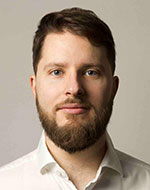 Michele Polese
Michele Polese
Michele Polese [M'20] is an Associate Research Scientist and Part-Time Instructor at Northeastern University, Boston, since March 2020, working with Tommaso Melodia. He received his Ph.D. at the Department of Information Engineering of the University of Padova in 2020 under the supervision of with Michele Zorzi. He also was an adjunct professor and postdoctoral researcher in 2019/2020 at the University of Padova. During his Ph.D., he visited New York University (NYU), AT\&T Labs in Bedminster, NJ, and Northeastern University, Boston, MA. He collaborated with several academic and industrial research partners, including Intel, InterDigital, NYU, AT\&T Labs, University of Aalborg, King's College and NIST.
He was awarded with the Best Journal Paper Award of the IEEE ComSoc Technical Committee on Communications Systems Integration and Modeling (CSIM) 2019, the Outstanding Young Researcher Award 2019 from the IEEE ComSoc EMEA Region, the Best Paper Award at WNS3 2019 and 2020, and the IEEE MedComNet Mario Gerla Best Paper Award 2020. His research interests are in the analysis and development of protocols and architectures for future generations of cellular networks (5G and beyond), in particular for millimeter-wave communication, and in the performance evaluation of complex networks.
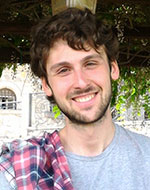 Marco Giordani
Marco Giordani
Marco Giordani [M'20] received his B.Sc. (2013) in Information Engineering, M.Sc. (2015) in Telecommunication Engineering, and Ph.D. (2020) in Information Engineering from the University of Padova, Italy, where he is now a postdoctoral researcher, under the supervision of Prof. Michele Zorzi, and an adjunct professor. He visited New York University (NYU), USA, and TOYOTA Infotechnology Center Inc., USA, in 2016 and 2019, respectively. He has been collaborating with several academic and industrial research partners, including InterDigital, NYU, TOYOTA, and NIST. He is the recipient of several awards, including the “IEEE Daniel E. Noble Fellowship Award” from the IEEE Vehicular Technology Society, the “Francesco Carassa Prize” from the Italian Telecommunications and Information Theory Group (GTTI), and the “Young Researcher Award” from the Human Inspired Technology Research Center (HIT). He has authored more than 40 published papers in the area of millimeter wave wireless networks, two of which have received Best Paper Awards. His research interests focus on protocol and architecture design for 5G/6G cellular and vehicular networks.
Tutorial 10: AI-enabled Future Wireless Networks: Opportunities and Challenges Towards 6G
Date: Tuesday, 12 January 2021
Time: 12:30 - 15:30 EST
Instructors: Dr. Melike Erol-Kantarci, University of Ottawa and Dr. Meryem Simsek, VMware
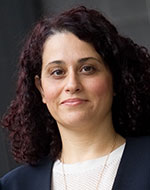 Melike Erol-Kantarci
Melike Erol-Kantarci
Melike Erol-Kantarci is Canada Research Chair in AI-enabled Next-Generation Wireless Networks and Associate Professor at the School of Electrical Engineering and Computer Science at the University of Ottawa. She is the founding director of the Networked Systems and Communications Research (NETCORE) laboratory. She has over 140 peer-reviewed publications which have been cited over 5400 times and she has an h-index of 37. Recently, she was selected for the 2019 list of “N2Women: Stars in Computer Networking and Communications”. She has received several best paper awards including the IEEE Communication Society Best Tutorial Paper Award in 2017. Dr. Erol-Kantarci is the co-editor of three books on smart grids, smart cities and intelligent transportation. She has delivered 50+ keynotes plenary talks, tutorials and panels around the globe. She is the Specialty Chief Editor for the Smart Grid Communications Section of the journal “Frontiers in Communications and Networking”. She is on the editorial board of the IEEE Transactions on Cognitive Communications and Networking, IEEE Internet of Things Journal, IEEE Communications Letters, IEEE Networking Letters, IEEE Vehicular Technology Magazine and IEEE Access. She has acted as the general chair and technical program chair for many international conferences and workshops. She is the Chair for the special interest group (SIG) on “Machine Learning and AI for Networking” and the Chair for “SIG on Green Smart Grid Communications” at ComSoc Technical Committees. She is a steering committee member for the IEEE Sustainable ICT Initiative. Her main research interests are AI-enabled wireless networks, 5G and 6G wireless communications, smart grid, electric vehicles, Internet of things and wireless sensor networks. She is a senior member of the IEEE and ACM.
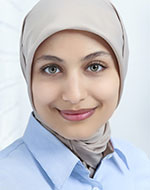 Meryem Simsek
Meryem Simsek
Dr. Meryem Simsek is a chief scientist of intelligent networking at vmWare. Prior to this, she was a senior research scientist at Intel Labs, where she was involved in the NSF-Intel Machine Learning for Wireless Networks and the NSF-Intel AI Research Institute programs. In her roles as senior research scientist at ICSI Berkeley and as research group leader at TU Dresden, she has been actively working on 5G and beyond, self-organizing networks, and on the Tactile Internet, such that she is a well-known scientist in both academia and industry. She has been working on Machine Learning for wireless systems since a decade and is the recipient of the IEEE Communications Society Fred W. Ellersick Prize in 2015 and the Rising Star in Computer Networking and Communications by N2Women in 2019. She has over 80 peer-reviewed publications, has co-edited two books, and has delivered 30+ invited talks and keynotes. She has initiated and is the Chair of the IEEE Tactile Internet Technical Committee and serves as the Vice Chair for the IEEE P1918.1 Standardization Working Group, which she has co-initiated. Additionally, she is a member of the IEE ComSoc Strategic Planning Committee, the IEEE ComSoc Emerging Technologies Committee, the vice-chair of the IEEE FNI Systems Optimization Working Group, and the coordinator of industry and student activities of the IEEE Women in Communications Engineering Committee. Her main research interests include future wireless networks, intelligent networking, machine learning, and self-organizing networks. She is a senior member of IEEE.


